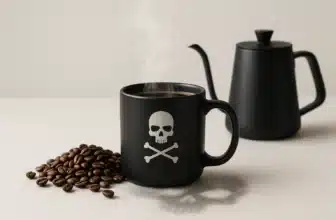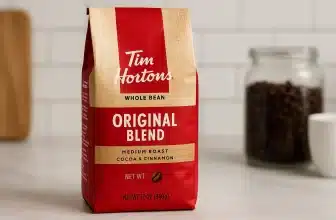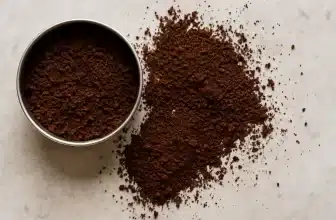
One Hundred Coffee is reader-supported, and some products displayed may earn us an affiliate commission. Details
That’s the question we’re tackling today. As someone who’s made the full journey from instant coffee to espresso machines and pour-overs with beans from Ethiopia, Guatemala, and Sumatra, I’m going to walk you through what makes specialty coffee special, whether it’s worth your time and money, and how to tell if it’s your kind of coffee.
Is Specialty Coffee Worth It? More Than Just a Cup
Who is this for?
Seattle’s Best Portside Blend is for everyday coffee lovers who want smooth, well-rounded flavor without the bitterness. Medium roasted and budget-friendly, it’s ideal for busy mornings, offices, or casual drinkers. Ground and ready to brew, it delivers consistent taste and great value in every cup—no fancy gear required.If you’ve ever picked up a $7 bag of supermarket coffee in one hand and a $22 bag from a small roaster in the other, you’ve probably asked the same question I did the first time I walked into a specialty café: Is this really worth it? After years of brewing at home, learning from roasters, cupping side by side, and occasionally burning a few batches in my early experiments, I can tell you there’s a lot more inside that pricier bag than pretty packaging. This isn’t a “coffee snob” manifesto; it’s a practical, human look at what you actually get for the money—flavor, freshness, transparency, farmer pay, and a better brewing experience—plus when specialty coffee isn’t worth it (because sometimes it isn’t), and how to decide what’s right for you.
What “Specialty Coffee” Really Means (No Buzzwords, Just Clarity)
“Specialty” isn’t a vibe—it’s a standard. Beans graded by certified tasters (Q graders) score 80+ on a 100-point scale to earn the label. That score reflects the cleanliness of flavor (no moldy or fermented defects), sweetness, acidity quality, mouthfeel, and balance. In real-world terms, it means fewer bad surprises and more deliberate flavor: strawberries and florals from Ethiopia, brown sugar and apple from Colombia, dark chocolate and spice from Guatemala, or blackcurrant and citrus from Kenya.
But the score alone isn’t the point. Specialty roasters usually:
- Publish roast dates (freshness you can see).
- Source transparently, often from specific farms or cooperatives.
- Roast to highlight origin rather than blanket everything under a dark, smoky profile.
- Teach you how to brew it (ratios, grind guidance, water temperature).
It’s like the difference between a decent loaf and one from a baker who tells you which grain, which mill, how long it fermented, and exactly how to reheat it for the best crust. Both are bread. One is an experience.
Why Specialty Costs More (and Where the Money Goes)
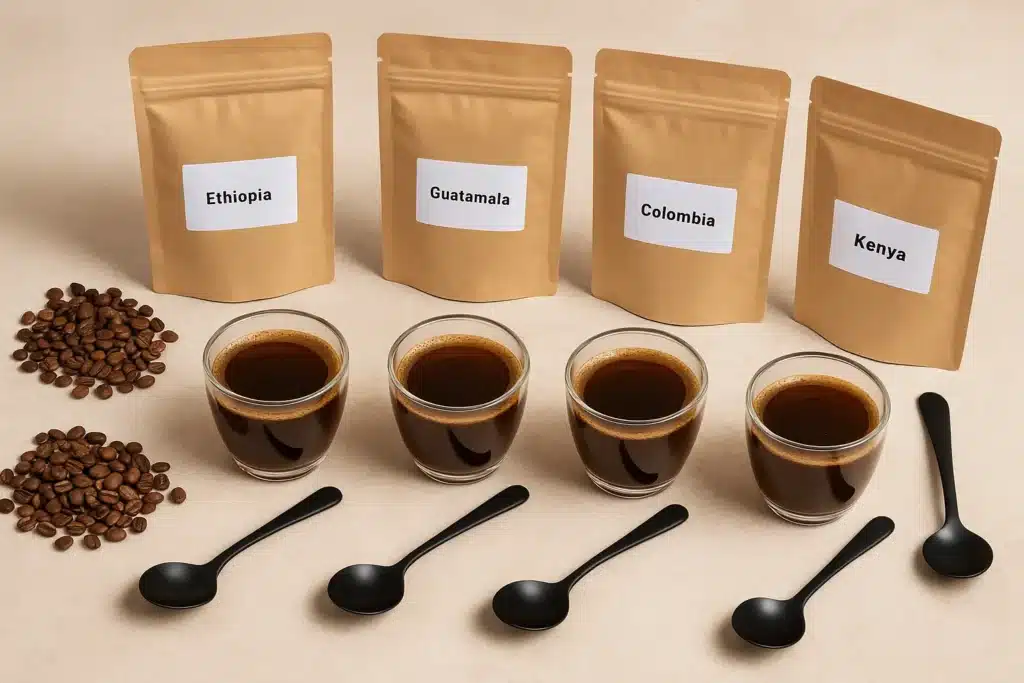
I used to think the price difference was mostly branding. Then a roaster walked me through their spreadsheet. Even without importing at scale, the costs stacked up in a way that made sense:
- Farm-gate price: Specialty buyers often pay well above commodity rates to support selective picking, careful processing, and fairer wages. Ripe cherries cost more to pick than “grab everything” harvesting.
- Micro-lot logistics: Smaller, traceable lots cost more to move, insure, and store.
- Roasting loss: Beans lose weight during roasting (water and volatile compounds), so the roaster sells fewer grams per green kilo purchased.
- Labor and QC: Cupping sessions, sample roasting, dialing profiles, recalibrating equipment, and discarding experimental batches that don’t pass quality.
- Sustainable packaging and education: Degassing valves, oxygen barriers, and content that actually helps you brew better at home.
Could a cheap bag taste “good enough”? Absolutely—especially drowned in cream and sugar. But if you drink coffee to actually taste coffee, that extra $5–$12 often translates into a dramatic jump in sweetness, clarity, and consistency.
Flavor: The First (and Most Persuasive) Argument
The day specialty “clicked” for me, I brewed two pour-overs side by side: a mass-market blend and a fresh, washed Ethiopian coffee. Same kettle, same water, same dripper, carefully weighed. They didn’t even smell like the same drink.
- The blend: generic “coffee” aroma, sturdy body, a faint bitterness that needed sugar.
- The specialty Ethiopia: honey and bergamot on the nose, citrus zest brightness that settled into a long, sweet finish. No sugar needed; it already tasted sweet.
That experience wasn’t a fluke. Specialty coffee, roasted for clarity, can deliver fruit tones, florals, chocolate, caramel, and spice with a kind of definition that doesn’t blur when the cup cools. It’s not just “strong vs. weak.” It’s sweet vs. bitter, layered vs. flat.
If flavor is your north star, specialty wins the value argument fast.
Freshness and Roast Date: The Hidden Performance Multiplier
Supermarket coffee is often roasted weeks (sometimes months) before it hits your grinder. Specialty roasters tend to date every bag and ship freshly roasted coffee. Freshness changes everything:
- Aroma: Volatiles that create complex aromas dissipate quickly. Fresh beans bloom; stale beans yawn.
- Extraction: Fresh coffee grinds more predictably and extracts more evenly, making it easier to hit that sweet spot where coffee tastes naturally sweet (not acidic or bitter).
- Stability: Within 5–20 days off roast (depending on roast level and storage), coffee tends to “hit its stride.”
If you’re chasing consistent, repeatable cups, a roast date is worth its weight in gold lettering. Specialty not only tells you the date; it often arrives within days.
Ethics, Sustainability, and Traceability (Yes, They Affect Taste Too)
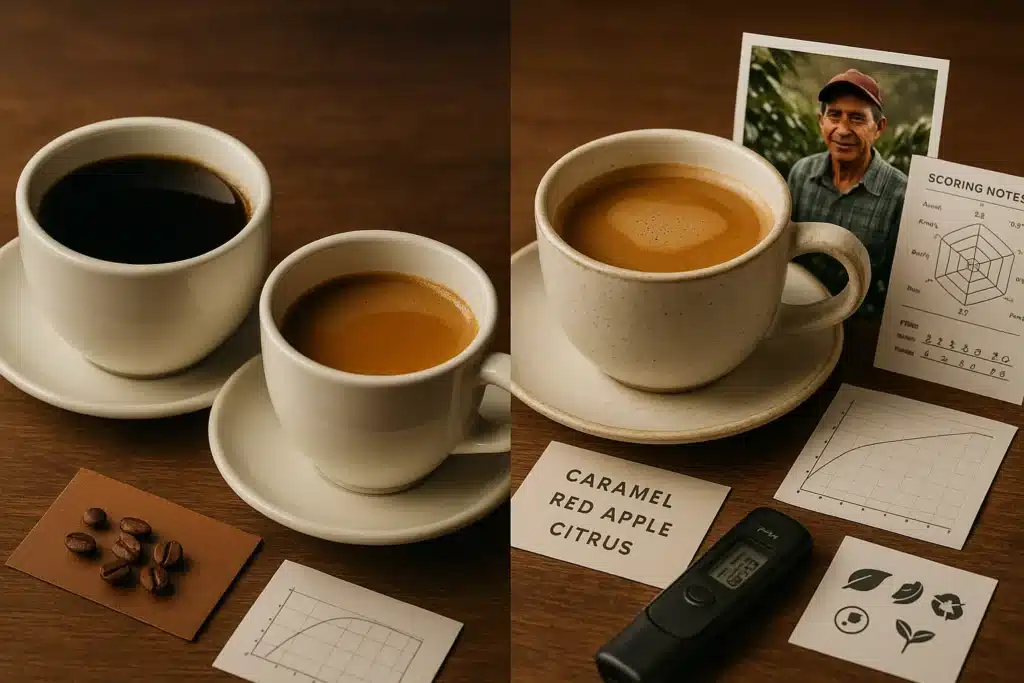
You don’t have to care about the supply chain to enjoy a cup, but when farmers can afford to pick only ripe cherries, sort defects, and invest in processing improvements, the result is literally better coffee. Specialty buyers often publish farm names, regions, varieties, and processing methods (washed, natural, honey, anaerobic). That transparency encourages quality. You can buy what you like again because you know where it came from.
And when a roaster says they pay above market to a certain cooperative or producer, you’re tasting the outcome of that premium: clean cups, nuanced flavors, fewer defects. That’s one reason two “Colombian” coffees can taste wildly different—one is a country label; the other is a relationship.
When Specialty Coffee Isn’t Worth It (Honest Take)
I’ve had specialty beans that tasted underdeveloped, grassy, or joyless. Price isn’t a force field. Sometimes a roast misses the mark. Sometimes the greens were average but marketed as rare. Sometimes your brewing setup isn’t aligned with the roast (a very light, delicate coffee through a moka pot can taste thin and sharp).
Skip specialty when:
- It’s been sitting on a shelf too long. A month+ past roast with a torn seal? Hard pass.
- The roaster hides the roast date and origin details. That opacity signals inconsistency.
- It’s not matched to your method. If everything you brew is milk-heavy lattes, a balanced medium-dark “specialty” blend might outperform a whisper-light single origin.
In other words, specialty is worth it when it’s fresh, transparent, and suited to how you brew.
Brew Method Matchmaking: Getting Your Money’s Worth
You don’t need fancy equipment to appreciate specialty coffee, but a few pairings make it shine.
Pour-Over / Batch Drip
Where specialty blossoms: clarity, aroma, sweetness. Use a 1:16–1:17 ratio, medium grind, 94–96°C water for light roasts. Aim for a total brew time around 2:45–3:30. If it tastes sharp, grind a smidge finer or raise temp 1–2°C.
French Press
Specialty in a press tastes plush and sweet when you coarsen the grind and keep the water around ~93°C. Steep for ~4 minutes, then stir, skim the surface, and press gently. If it tastes muddy, pour through a paper filter into your mug.
AeroPress
A great “sweetness amplifier.” Try 15 g coffee to 225 g water, 90–93°C, 2-minute total time, paper filter. Inversions bring body; standard brings clarity.
Moka Pot
Specialty can work, but original nuance may get lost. Choose medium to medium-dark roasts for chocolate and caramel, fill the basket level (don’t tamp), low heat, and cut it with hot water for balance.
Espresso
Specialty espresso is breathtaking when dialed in: syrupy sweetness, fruit, and florals. Light roasts need higher temps and tighter prep (18 g in → 42–46 g out in 30–34s at 94–95°C is a solid starting point). If you prefer easy chocolate and caramel for milk drinks, medium-dark roasts are more forgiving (18 g in → 36–40 g out in ~27–30s at 92–93°C).
The Taste Test You Can Do at Home This Weekend
- Buy two bags: a fresh specialty single-origin with a roast date and a popular mass-market blend.
- Brew both side by side: same water (filtered), same ratio (1:16), same dripper, back-to-back pours.
- Taste hot, then as they cool. Specialty should keep sweetness, reveal layers. The blend may flatten or push bitterness forward.
- Add a splash of milk to both. Which holds its character?
You don’t need a trained palate to feel the difference. Your tongue knows sweetness and balance.
How Much More Are You Paying, Per Cup?
Let’s do the quick math. Suppose a 12-oz (340 g) bag is $18 (specialty) vs. $10 (mass-market). If you dose 20 g per 320 g cup, you’ll get about 17 cups per bag.
- Specialty: $18 / 17 ≈ $1.06 per cup
- Mass-market: $10 / 17 ≈ $0.59 per cup
You’re paying an extra $0.47 for sweetness, clarity, farm-level investment, and a better brewing experience. If coffee is your daily ritual, that’s not a huge premium for a cup you actually look forward to.
Troubleshooting: Making Specialty Taste Like It Should
- Tastes sour/underdeveloped? Grind finer, raise water temp 1–2°C, extend contact time slightly. Check your dose (don’t under-dose specialty).
- Tastes bitter/ashy? Grind coarser, drop water temp to ~92–93°C, reduce agitation and total time.
- Thin body? Increase the dose a touch (1:15), or switch to an immersion-leaning method (AeroPress/French press).
- Muted aromatics? Check bean age, storage, and grinder burrs. Fresh grind is everything.
“But I Add Milk and Sugar”—Is Specialty Still Worth It?
Yes—just choose the right roast. A thoughtfully roasted medium or medium-dark specialty blend will give you chocolate, caramel, and nutty sweetness that still cuts through milk. You’ll get fewer harsh edges and more natural sweetness, which means you may find yourself needing less sugar over time. It’s a gentle nudge toward better flavor without changing your routine.
Storage: Protect the Good Stuff
- Keep it sealed in an opaque, airtight container at room temperature.
- Avoid heat and sunlight. Countertop jars under a window are enemies.
- Freeze only if needed, and portion first (single-dose bags). Thaw sealed before opening to avoid condensation.
- Grind right before brewing. Pre-ground specialty loses half the magic.
The Learning Curve: How Specialty Makes You a Better Brewer
Specialty coffee invites you to play. You start noticing how a 1-degree temperature change affects sweetness, how a gentler pour increases clarity, how a 10-second difference in espresso yield shifts from tart to honeyed. That curiosity quietly improves every cup you brew—specialty or not. It’s like listening on better headphones: you hear details you didn’t know were there, and suddenly you know how to tune the sound.
Best Selections Curated for Specialty Beginners
To honor your request for variety, I rotate brands each time. Here are widely available, Amazon-listed options that showcase why specialty is more than a label—chosen to cover different taste preferences and brew methods:
Verve Coffee Roasters “Streetlevel” (Medium) – Balanced, chocolate-forward with gentle fruit highlights; a crowd-pleaser for espresso and milk drinks without losing nuance.
Who is this for?
Verve’s Vancouver Blend is for craft coffee lovers seeking a balanced, medium roast with smooth body and bright acidity. Direct-trade sourced and meticulously roasted, it offers notes of citrus and chocolate. Ideal for pour-over, drip, or French press brewers. A perfect daily brew for fans of artisanal, sustainable coffee.La Colombe “Corsica” (Medium–Dark) – Comforting and consistent, ideal for those transitioning from dark roasts to specialty; holds up beautifully with milk.
Who is this for?
La Colombe Corsica is for coffee lovers who want deep, rich flavor in every cup. Designed for Keurig brewers, this medium-dark roast delivers bold chocolatey notes with a smooth finish. It’s perfect for those who enjoy a full-bodied morning brew with premium quality in a convenient, single-serve pod.Equal Exchange Organic (Varietals) – Ethically sourced, reliable sweetness, and clean cups. A solid entry point if transparency and farmer pay matter to you, alongside flavor.
Who is this for?
Equal Exchange Organic Coffee is for socially conscious drinkers who value fair trade and rich, robust flavor. Grown by small-scale farmers and roasted with care, it delivers a balanced, medium-dark roast with chocolatey notes. Perfect for pour-over, drip, or French press. Ethical, flavorful, and reliable for everyday enjoyment.Specialty vs. “Third Wave”: What’s the Difference?
People use “third wave” to describe a movement that treats coffee like wine: origin-specific sourcing, lighter roast profiles to spotlight terroir, and obsessive attention to water, grind, and extraction. Specialty is the quality tier; third wave is the culture surrounding how we buy, roast, brew, and talk about that quality. You can drink “third wave” style coffee that’s not technically specialty grade—and vice versa—but they often overlap.
Single Origin vs. Blend: Which Should You Start With?

- Single origin (one farm/region): Best for tasting place—the strawberry-jam Ethiopia, the blackcurrant-bright Kenya, the nutty-sweet Brazil. They can be breathtaking, but sometimes less forgiving.
- Blends: Designed for balance and consistency. If you add milk, blends often make you happiest, especially at medium to medium-dark profiles.
If you’re new to specialty, start with a balanced blend and a single-origin side by side. You’ll learn what you prefer in a week.
Water Quality: The Quiet Ingredient
If your coffee suddenly tastes flat, and you’re sure your beans and grind are right, check your water. Extremely hard water can mute acidity and sweetness; very soft or distilled water can make coffee taste sharp and hollow. Filtered water with moderate hardness tends to extract best. You don’t need lab beakers—just avoid extremes and stay consistent so you can trust your adjustments.
Health and Comfort: Light vs. Dark, Acidity, and Your Stomach
In coffee talk, “acidity” is a flavor quality (like a crisp apple), not a measure of stomach burn. Actual pH differences between roasts are smaller than people think. That said, your body is your best instrument:
- If coffee bothers your stomach, try brewing cooler (90–93°C), coarser, and shorter to reduce harsh compounds.
- Try washed process coffees (often gentler) before diving into very fruity naturals.
- Medium roasts are a fine middle path: sweet, round, and less likely to present sharp edges.
A Simple One-Week Plan to Decide for Yourself
Day 1–2: Buy one fresh single-origin (light–medium) and one approachable blend (medium–dark).
Day 3: Brew both at 1:16 with 94°C water. Note the sweetness and aftertaste.
Day 4: Adjust grind and temp to fix any sour/bitter notes.
Day 5: Try a milk drink (AeroPress concentrate or moka/espresso) with each.
Day 6: Brew both as iced coffee—flash-chilled or cold brew—to compare how flavors carry when cold.
Day 7: Pick your weekday “workhorse” and your weekend “treat.” That’s your personal specialty roadmap.
Real Talk: Joy per Cup
I track spending, so I get the budget concern. But specialty coffee improved my mornings out of proportion to the extra cost. The flavor jump means I slow down for a minute, actually taste, and carry that little win into the day. On rushed mornings, a reliable medium-dark specialty blend makes a latte that tastes like dessert without dumping in sugar. On quiet weekends, a light single-origin can taste like summer fruit in a mug. Those small, repeatable joys add up.
Quick Answers to Common Questions
Is specialty coffee always light roast?
No. Specialty can be light, medium, or dark—what makes it “specialty” is green quality and roasting skill, not darkness.
Will I need expensive gear?
A reliable burr grinder matters more than an expensive brewer. A decent pour-over cone or a solid drip machine can showcase specialty beans beautifully.
How long does specialty stay fresh?
Best within 2–6 weeks of roast. Reseal between uses, avoid heat and light, and grind right before brewing.
Can I use a specialty in a French press or a Moka pot?
Absolutely. Choose a roast that matches the method (medium or medium-dark for moka/french press; lighter for pour-over/drip).
Is it worth it if I drink only iced coffee?
Yes—try medium or medium-dark for chocolatey cold brew. If you like fruit-forward iced coffee, washed or natural light roasts can be stunning when filtered well.
The Bottom Line: Is Specialty Coffee Worth It?
If you value flavor, freshness, and consistency, and if a morning cup is more than caffeine for you, then yes—specialty coffee is worth the premium. The difference shows up in the cup, in the way your kitchen smells, in how reliable each bag feels from brew to brew. You’re also voting for better practices upstream—ripe picking, careful processing, fairer pay—so the next harvest can taste even better.
If coffee is just a caffeine vehicle and you load it with sugar and cream without much thought to taste, you can save your money or step into specialty with a balanced medium-dark blend that respects your ritual. You’ll still notice fewer bitter surprises and a cleaner aftertaste.
As for me, I keep two lanes at home: a friendly, chocolate-leaning medium-dark blend for milk drinks and guests, and a single-origin light or light-medium for slow, quiet mornings. That mix gives me joy and control, and it’s the best answer I can offer: specialty is worth it when it makes your everyday better—one cup at a time.







